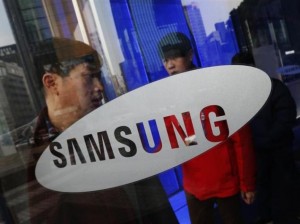 Samsung Electronics Co Ltd, under pressure to appease investors who have berated it for hoarding the spoils of rapid growth, has pledged to hand out even more profit after almost doubling its full-year dividend to a record $2 billion.
Samsung Electronics Co Ltd, under pressure to appease investors who have berated it for hoarding the spoils of rapid growth, has pledged to hand out even more profit after almost doubling its full-year dividend to a record $2 billion.
The main rival of Apple Inc has amassed $51 billion in spare cash in recent years by selling as many as one of every three smartphones, but the amount of profit reaching shareholders hit its lowest in 2012 in five years.
Some investors have called for more returns, but the biggest maker of TVs, smartphones and memory chips, has been reluctant to change its payout policy largely because it needs funds for heavy investment.
The maker of Galaxy smartphones, on reporting its first quarterly operating profit decline in two years on Friday, doubled its 2013 dividend yield as planned to 1.0 percent. Investors point out that is still half of Apple’s 2.0 percent.
“Our goal on dividend payout for this year is to have that significantly increase from 2013, but I can’t say for sure how much we’ll be paying,” Robert Yi, head of Samsung’s investor relations, told analysts after the earnings release.
The South Korean manufacturer declared a 14,300 won per share dividend for 2013, or a total handout of 2.1 trillion won. The amount is 79 percent more than a year earlier but is just 6.9 percent of 2013 profit.
“Samsung is clearly under growing pressure to return more to investors,” said Park Jung-hoon, a fund manager at HDC Asset Management.
“With its shares trending down, I think Samsung will have to consider extra measures like a share buyback at some point to address shareholder pressure.”
Special bonus
Samsung posted a 6 percent on-year decline in operating profit for October-December to 8.3 trillion won, the company said on Friday, matching its previous estimate.
The figure was brought down by an 800 billion won special employee bonus to commemorate 20 years since Chairman Lee Kun-hee announced a management strategy that the company regards as the catalyst to its recent growth.
A stronger domestic currency also knocked off around 700 billion won.
“It will be challenging for Samsung to improve its earnings in the first quarter as the weak seasonality of the IT industry will put pressure on demand for components and TV products,” the company said in a statement.
Shares of Samsung, worth $204 billion, edged up 0.54 percent after the earnings release, compared with the benchmark index which fell 0.64 percent. The stock has fallen 8 percent in the past month on concern over slowing smartphone growth.
Smartphones disappoint
The chip maker said its capital expenditure, a barometer of broader technology industry demand for manufacturing tools such as chip equipment, will be similar in 2014 to the 23.8 trillion won of 2013. Spending on marketing, however, will decline relative to revenue.
“We’ll actively leverage global sports events such as the Sochi (Winter) Olympics and our retail channels but we will try to raise the efficiency of our marketing spend and lower our overall mobile marketing budget to revenue this year compared with last year,” Kim Hyunjoon, senior vice president of Samsung’s mobile business, told analysts.
Operating profit at its cash cow mobile division stood flat at 5.47 trillion won, but slipped 18 percent from July-September’s record 6.7 trillion won as Apple’s new iPhones drew away sales during the year-end holiday period.
Weaker-than-forecast sales of the Galaxy S4 left smartphone screens sitting in the inventory of unit Samsung Display, where operating profit tumbled 90 percent to 110 billion won.
The company is bracing for tougher competition with Apple in major markets this year, especially in China where the U.S. firm started selling iPhones through China Mobile Ltd, the world’s biggest carrier by subscribers.
Apple is also widely believed to be working on bigger-screen smartphones, Samsung’s mainstay products.
Samsung said smartphones will account for 70 percent of total mobile product shipments this year and that it would broaden its tablet line-up with mid- and low-end models and larger screens.
Source-NDTV





